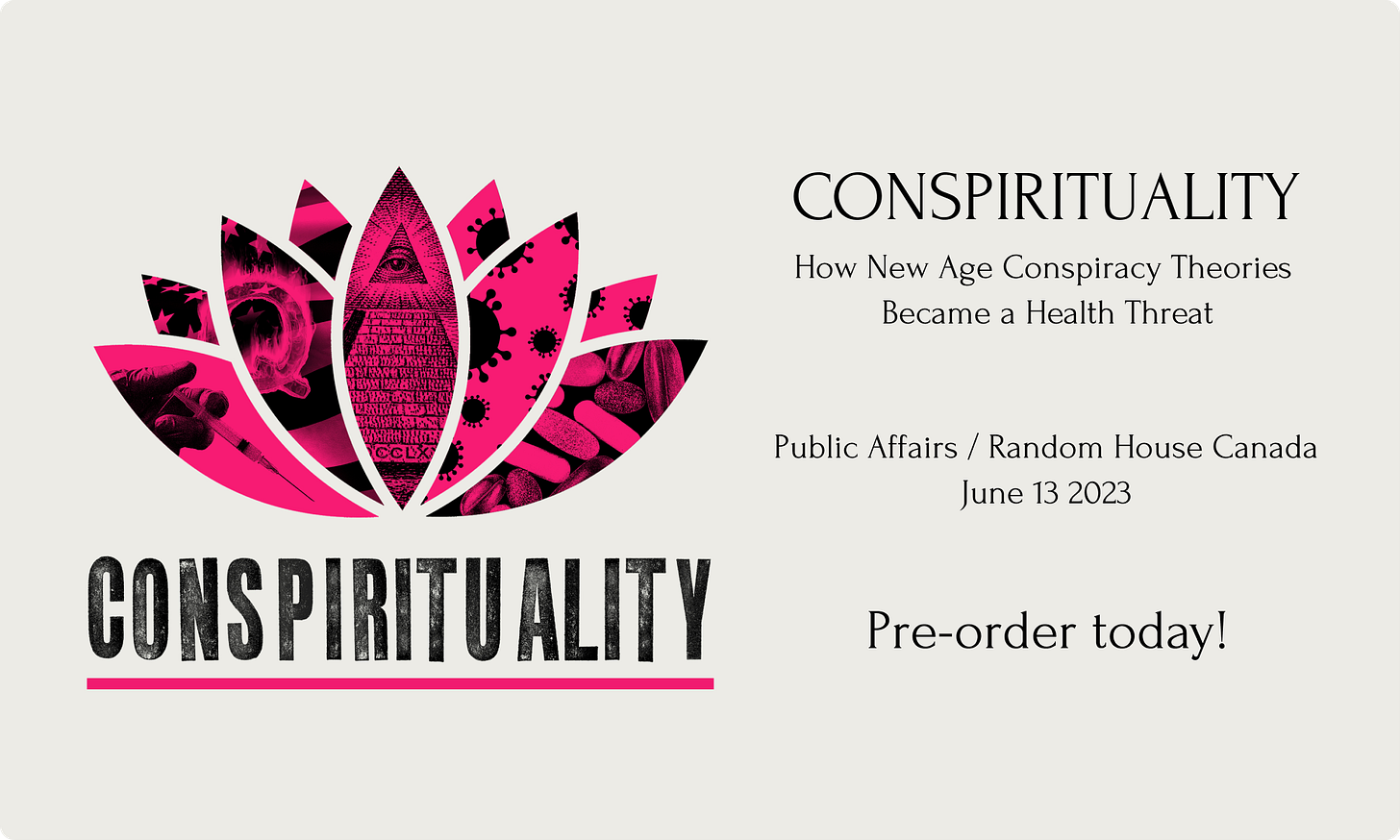One of the persisten criticisms we’ve received at Conspirituality goes something like this:
You think the vaccines work? You must love Big Pharma!
Besides usually being served on a giant plate of whataboutism, this sentiment displays the binaries many anti-vaxxers currently broker in. I detailed this phenomenon in my last post about Russell Brand’s evasion techniques, in which instead of answering a specific question he pivots with all sorts of irrelevant data in an attempt to overwhelm his debaters.
To avoid that distraction, let’s drill down on one question: does supporting COVID vaccines mean you love pharmaceutical companies?
An absurd assumption.
How about this: Can one both recognize that pharmaceuticals save millions of lives while making life better for countless more and understand that C-Suite players in a for-profit healthcare industry care about profits above all else?
Now we’re getting somewhere.
I’ve been critical of this industry for some time. A few examples:
In 2014, I wrote about research that shows Botox — a drug that AbbVie Cosmetics pulls in annual $642 million from — has a negative impact on emotional regulation. Three years later, I noted that plastic surgery is a $16 billion business — a number that has risen considerably since.
We can certainly criticize pharmaceutical companies for capitalizing on low-self esteem that leads to such cosmetic procedures, and work toward interventions that help people value their bodies.
In 2018, I wrote about the potential problems with studies funded by pharmaceutical companies. Two years later, I noticed the disturbing trend that two-thirds of American consumer advocacy groups are funded by pharmaceutical companies, calling for lobbying reform in Washington.
In 2020, as I worked on a book on psychedelic therapy, I talked with Robert Whitaker about pharmaceutical tactics to fudge studies in order to gain FDA approval. This follows a 2018 article where I talked to Lauren Slater about the problem of tapering off antidepressants, and the fact that pharmaceutical companies don’t offer protocols.
Of course, some people receive valuable treatment from pharmaceuticals. But other do not. And the science behind these drugs is always evolving, like when it was discovered that weight gain affects the efficacy of antidepressants (and is also a side effect of them). The following week, I covered research showing that antidepressants can lead to increased suicide ideation and self-harm in teenagers, which made me ask, a few weeks later, if informed consent should be involved when prescribing them to anyone.
I’ve also written about the possible alleviation of mental health distress through exercise, which would reduce the need for antidepressants in some people. And while excited about the possibilities of psychedelic therapy to do the same, I also wrote about the insidious way that Janssen Pharmaceuticals manipulated data to fast-track ketamine onto the market.
I’ve been critical of the chemical theory of depression, which opened up the doors for pharmaceutical companies to exploit the health insurance and healthcare industries. And I was glad when the FDA required addiction warnings on benzodiazepines.
Then there was the fun time in 2018 I got to write about doctors accepting free lunches from pharmaceutical companies in exchange for prescribing more opioids. My closing sentiment definitely sounds like a love affair with pharma:
Signal vs Noise
I fell in love with science writing in 2007 thanks to Dan Levitin’s book, This is Your Brain on Music. Since that time, I’ve read 100+ science books and hundreds of studies. And the only thing I can say for certain in regards to science is almost nothing is certain.
That’s partly because science evolves as our understanding of science evolves. And that’s why controlled studies, while not perfect, are so valuable, and why anecdotes are generally uninformative (though in large data sets can be telling).
So when reporters declared that COVID vaccines prevented infection, they weren’t being malicious. Impatient, perhaps, which led to poor information getting out to the public. As our understanding of the virus evolved, and as the virus mutated, better and more recent information was released.
There’s certainly a problem with poor science communication. But there’s also a problem with expecting that once a statement gets out, it should be the final word. That’s not how science (or any reasonable person) functions.
Do I love Big Pharma? I’m grateful that chemotherapy has extended my life and stopped my cancer from metastisizing. I’m thankful that a number of family members and close friends would be dead by now if not for life-saving drugs.
Simply put, we don’t reach eight billion people on this planet without pharmaceutical intervention. (Whether or not that many people is a good thing is a different debate.) And we certainly don’t scale at this rate without public health measures.
Love is the wrong word. Grateful that so many researchers and scientists have put in groundbreaking work to help humans live longer and better. Frustrated that they mostly work for greedy men whose biggest motivation is money. Hopeful that enough people get mad enough to force regulatory changes that reduce pharmaceutical lobbying power, give the FDA more teeth, and provide health care for all (though I won’t hold my breath).
Just as good science is a holistic endeavor, so is good thinking. Claiming someone has to be pro-pharma because they understand COVID vaccines are efficacious is neither good science or thinking. It’s just more noise.








Thank you! Our entire society has an issue with false dichotomies and that is certainly on full display with conspiritualists. Most things aren't either/or but yes/and. I too have been kept alive by big pharms and they are also greedy bas*****. Too many people think it has to be one or the other! I love the podcast, by the way.
Big Pharma shill here and you’re spot on. While we scientists in the trenches will never be filthy rich, we can make a decent living in a pretty volatile field. Our academic colleagues that are funded by govt grants lay the path for our drug development. Like it or not, the profit motive drives incredible discoveries, like the newest forms of cancer treatments (car-T, keytruda, etc), rheumatoid arthritis, HepC and AIDS. We love what we do for society and it permeates our daily work lives. There are plenty of evil executives in every industry but that doesn’t mean lives that could be saved have to be sacrificed for a pure economic philosophy.